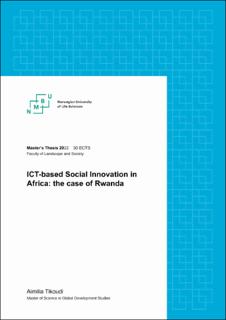| dc.description.abstract | Information and Communication Technology (ICT) in Sub-Saharan Africa has raised attention for its potential to foster multidimensional development. The rationale for ‘ICT for Development’ (ICT4D) revolves around Africa’s prospects to leapfrog to the digital economy amidst the 4th Industrial Revolution. This thesis reflects on the tech-based initiatives stemming from the African continent through the lens of “Social Innovation”. In other words, ICT-based applications whose primary goal is to tackle social challenges. Related tech products and services are seen as a ‘disruptive’ vehicle to address Africa’s need for ‘Homegrown Solutions’ to regional problems. They are context-specific and tailor-made to local realities.
The conditions that foster the creation of impact-driven ICT innovation vary widely among African countries. The continent illustrates diverse ‘innovation ecosystems’ and ‘innovation cultures’. Nevertheless, there is a knowledge gap on how social innovation can be deliberately planned at large scale, and thus on how it translates into a practical formal strategy in contemporary African societies.
This study examines Rwanda as a distinct case of African ICT-Based social innovation, that effectively manages to plan ICT-based Social Innovation as a state-led, formal practice. Embarking from the devastating 1994 genocide, Rwanda placed ICT at the forefront and formed a global “success story” of recovery and redevelopment. Presently, ICT Innovation is a cross-cutting force in Rwanda’s development agenda, serving the country’s complex socio-cultural context and macroeconomic particularities. Therefore, social innovation is policy-oriented and serves a long-term vision.
The study investigates Rwanda’s approaches to reinforce ICT-based social innovation, by creating a conducive social innovation ecosystem and an innovation culture. It reviews strategies and practical initiatives that Rwanda employs for public mobilization and capacity-building and maps the conditions that enable social innovation to grow in Rwanda. The research conducted a preparatory document review of policies and strategies to outline Rwanda’s key priorities in ICT Innovation and ICT4D. Sequentially, the data collection used in-depth, semi-structured interviews with key informants in Rwanda.
The thesis is exploratory and aims to identify key areas for further investigation. Results showed that the government’s openness to innovation and experimentation create a sense of shared purpose for innovation actors. The government designs tailor-made programs and campaigns directed to both users and innovators and establishes flagship regional initiatives that combine local and global approaches. Social innovation is enabled by a wide range of factors, notably sociocultural features, strong political will, the conducive business climate, Rwanda’s tech-based and market-driven development model, and Rwanda’s regional role as an ICT Hub in Africa. Perhaps more strikingly, visionary leadership and political championship enable the incremental growth of innovation. Rwanda’s social innovation ecosystem is supportive, synergetic and provides diversified opportunities for capacity-building and growth, whilst the innovation culture integrates cultural and traditional values in entrepreneurial ventures. Nevertheless, social innovation is a work in progress with challenges concerning finance, human resources, or adoption. Rwanda’s strategies are no fixed-recipe, but bring intriguing implications on how customized planning instruments can shape the conditions for social innovation to emerge. | |
